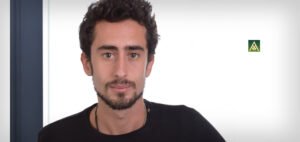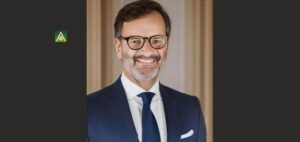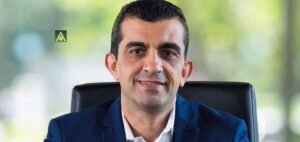The hum of the laboratory was constant—machines whirring, beakers clinking, the quiet symphony of discovery. Within this carefully controlled environment, Mohamed Trabelsi felt restlessness. Science provided answers, but it couldn’t capture the depth of human experience. He realized that life and business weren’t just about logic; they thrived on connection. Mohamed’s shift from research to business was personal—his purpose, which lay beyond observation, in driving real impact through understanding.
From the Lab to the Boardroom
Raised in France Mohamed developed a passion for problem-solving, creativity, and communication. His career started in France, working in material science research and development. While he enjoyed research and problem-solving, he craved human interaction. Seeking opportunities beyond the lab, he pursued a career in the Middle East, open to any industry where he could apply his skills. His breakthrough came when an American company hired him as a sales consultant in Saudi Arabia’s construction sector. Though he lacked conventional credentials, his enthusiasm set him apart. As a French North African, he adapted quickly to the Middle Eastern business landscape, merging analytical thinking with cultural adaptability to attract and retain customers.
His public speaking journey began when he discovered the “Toastmasters” community in Dubai, fueling his enthusiasm for using oration to drive change. Mohamed developed a winning formula—balancing strategy with effective tactics to drive long-term success. His background in R&D, which honed his skills in challenging the status quo and observing patterns, enabled him to master sales, analyze competitors, and understand customer needs.
Prioritizing Customer-Centric Strategies for Lasting Success
Many brands struggle to build lasting customer relationships. Recognizing that customers are emotional beings, Mohamed advocates for an ‘Outside-In’ approach—placing customer needs at the core of the business strategy.
Companies must be willing to sacrifice short-term gains to preserve reputation and trust. Success lies in an unwavering dedication to customer satisfaction, shifting from generic offerings to tailored experiences. It is essential for companies to consistently reassess and innovate their approaches—not only to address their customers’ pain points but also to elevate their productivity. By providing tailored solutions and delivering an exceptional customer experience, businesses can foster deeper engagement, strengthen brand loyalty, and drive long-term success.
Embracing the ‘less is more’ philosophy—a fundamental lesson ingrained during his early years working alongside his father on construction sites in France—he learned the value of focus, discipline, and resilience in the face of adversity. These formative experiences not only sharpened his ability to navigate challenges but also laid the ground- work for defining strategic business priorities and executing plans with precision. Market strategies may seem effective on paper, but real-world success comes from direct customer engagement, understanding unspoken frustrations, and delivering practical solutions.
Carving a Niche in a Competitive Market
Mohamed’s success lies in identifying hidden bottlenecks in the customer journey, effective market reach strategies, and leveraging brand strengths to stand out. His strategy enhances market positioning, increasing customer retention and fostering brand advocacy to pay a premium.
A defining example was his tenure at Gyproc Middle East, tasked with expanding its presence in Saudi Arabia. Despite years of effort, Gyproc struggled to compete against four well-established local manufacturers with strong distribution networks and lower costs. Mohamed identified a market trend: high-end hotels preferred concrete walls.
Instead of competing directly, he went the extra mile by engaging with unconventional stakeholders like hotel operators to uncover their latent needs that helped him to propose an alternative wall system—strong yet lightweight, faster to install, and cost-effective. Most importantly, it increased room space, an attractive benefit for hotel owners.
This customer-centric approach transformed Gyproc’s market positioning. By addressing a specific pain point, the company carved out a sustainable niche and reshaped market perceptions.
Rethinking Market Channels to Boost Growth
At Gerflor, Mohamed faced another challenge—an industry pioneer losing market share despite a construction boom.
The company’s reactive approach and reliance on partner performance led to stagnation. Stepping in, Mohamed spearheaded a new market strategy, segmenting distribution channels, tailoring solution offerings, and overhauling the lead nurturing process and infrastructure. This transformation required internal alignment, management buy-in, and trust-building with customers and partners.
By fostering collaboration and executing a structured strategy, the company not only regained lost ground but also strengthened brand loyalty among customers and employees. The lesson was clear: a business’s success depends on understanding its unique position and aligning sales strategies accordingly.
One common challenge Mohamed encountered was inconsistent pricing strategies. Sales representatives often provided conflicting quotes on the same project, leading to frustration and distrust. To solve this, he led a pricing process overhaul supported by technology, ensuring transparency and consistency. This adjustment improved profitability while enhancing customer relationships.
Empowering Innovation Through Customer-Centric Leadership
Mohamed’s remarkable ability to navigate and overcome challenges stems from three core principles: an unwavering dedication to understanding and resolving customer pain points, an entrepreneurial mindset that embraces rapid experimentation and continuous learning from setbacks, and, most importantly, the empowerment of human capital to drive meaningful and transformative change.
Understanding the true concerns of your customers is an ongoing challenge that demands a meticulous, outside-in approach to mapping the entire customer journey. This perspective not only reveals opportunities for innovation and differentiation but also ensures businesses stay ahead in an increasingly competitive landscape. In today’s market, deeply aligning with customer needs isn’t just advantageous—it’s essential for sustained success.
Leading diverse teams in the Middle East taught Mohamed the importance of openness, empathy, and multiple perspectives. A memorable experience was mentoring a struggling team member into a top performer, reinforcing his belief in situational leadership.
Beyond leadership, Mohamed draws inspiration from the startup ecosystem, applying its principles to the construction industry. He follows a lean startup approach, starting with a Minimal Viable Test (MVT)—pitching a solution to select customers before investing resources. Their feedback determines its viability, leading to a Minimum Viable Product (MVP) with initial order commitments. This method reduces development time, minimizes risk, and provides real market insights before full-scale investment.
The Power of Integrity
Every leader faces critical decisions that test their values. Mohamed approaches these moments by asking three key questions:
- What is the direct benefit?
- What could go wrong?
- What opportunities am I missing by ignoring it?
By weighing these factors, he ensures decisions align with long-term success and brand integrity.
One defining moment was when he declined a highly profitable project rather than bypass a trusted partner. While the short-term gain was tempting, it would have compromised a crucial relationship. Weeks later, the partner learned of his decision and, recognizing his integrity, responded by shifting all their work exclusively to Mohamed’s brand. This reinforced his belief that ethical decision-making, even when initially costly, leads to greater long-term rewards.
Transformative Power of Active Listening
If there is one principle Mohamed champions, it is the power of truly listening. Quoting Stephen R. Covey, he reminds himself, “Most people do not listen with the intent to understand; they listen with the intent to reply.” In business and life, perspectives are shaped by personal experiences, meaning true understanding requires setting aside biases and actively engaging with others. Active listening, he believes, is not just a skill—it’s a game-changer in building trust, uncovering opportunities, and making better decisions.




